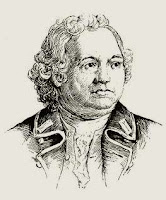“Account of the Declaration being read upon Prospect-Hill”
 Yesterday I quoted a description of the flag that Gen. Israel Putnam (shown here) had raised in July 1775 from David Humphreys’s short biography of the man, published thirteen years afterwards. I knew I’d seen a contemporaneous report in a newspaper, though, so I tracked that down.
Yesterday I quoted a description of the flag that Gen. Israel Putnam (shown here) had raised in July 1775 from David Humphreys’s short biography of the man, published thirteen years afterwards. I knew I’d seen a contemporaneous report in a newspaper, though, so I tracked that down.
This quotation comes from the 25 July 1775 New Hampshire Gazette. The same item was printed in several other papers, and this might not have been its first appearance. The “Declaration of the Continental Congress” that it refers to is not the Declaration of Independence, but the Declaration of the Causes and Necessity of Taking Up Arms, drafted mainly by John Dickinson and issued on 6 July 1775.
A Gentleman has favoured us with the following Account of the Declaration being read upon Prospect-Hill.Humphreys’s account complements this one by stating that the flag came from Connecticut and bore that colony’s symbols. This report is less parochial, but still reflects New England culture in its easy allusion to the enemy as “Philistines” and the writer’s own side as “Israelites.”
Last Tuesday Morning, according to Orders issued the Day before, by Major-General Putnam, all the Continental Troops under his immediate Command assembled on Prospect-Hill, when the Declaration of the Continental Congress was read, after which an animated and pathetic Address to the Army was made by the Rev. Mr. [Abiel] Leonard, Chaplain to General Putnam’s Regiment and succeeded by a pertinent Prayer; when General Putnam gave the Signal, and the whole Army shouted their loud Amen by three Cheers; immediately upon which a Cannon was fired from the Fort, and the Standard lately sent to General Putnam was exhibited flourishing in the Air, bearing on one Side this Motto, AN APPEAL TO HEAVEN--- and on the other side, QUI TRANSTULIT SUSTINET.
The whole was conducted with the utmost Decency, good Order, and Regularity, and to the universal Acceptance of all present.----And the Philistines on Bunker’s Hill heard the Shout of the Israelites, and being very fearful, paraded themselves in Battle Array.

No comments:
Post a Comment